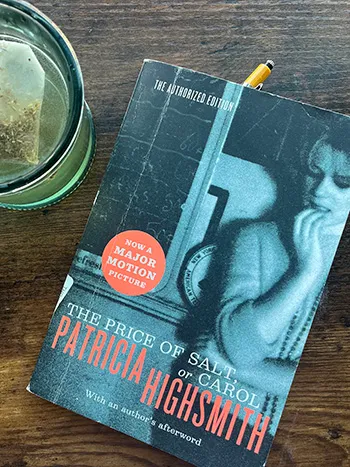
THE PRICE OF SALT
PATRICIA HIGHSMITH
© 1991 W. W. Norton & Company
$19.95
292 pages
Trigger warning: Homophobia
Queer Christmas is over, which means we're on to much-inferior regular Christmas. Holiday Queer movie options are several delightful Hallmark trainwreck romance movies, or Carol. Oh Carol. Nobody forgets their first time. Mine was when I was forced to watch this by a woman I "hung out" with for three months without ever knowing whether or not we were dating. Let's just say the two hours of Sapphic yearning hit a little too close to home. Moreover, most of my Queer life was already spent mooning over straight women I wished were Gay, so I did not relish paying a $12 movie ticket for it, even if that straight woman was Cate Blanchett.
The 1952 Lesbian thirst trap by Patricia Highsmith that inspired the movie was the first Lesbian novel to have a "happy" ending (spoiler: not that happy). It's also the first to feature a "stereotype-defying" relationship, i.e., femme for femme.
To summarize, Therese is an aspiring set designer working at a toy store. She meets Carol, a hot blonde ten years her senior going through a messy divorce. After a single "let's not define this" date, Therese, who is struggling financially and has just pawned her jewelry for pennies, spends $70 on a purse for Carol (about $800 today). After two dates, they embark on a multistate road trip.
Unfortunately, midway, they find out they're being tailed. Their hotel rooms have been bugged by a detective hired by Carol's husband so he can gain full custody of their daughter. Carol breaks up with Therese, as it's the only chance she has of being able to see her daughter. Unfortunately, she fails. Her husband gains full custody, and she receives only occasional, supervised visits.
With nothing left to be taken from her, she finds Therese, who is initially bitter that Carol chose her daughter over her (yes, Therese sucks), but eventually they decide to try their relationship again.
The best part of this book is the chase scene, when Carol and Therese are on a cross-country race as they flee the detective. It's not perfect (we're blue-balled by a Chekhov's gun that Carol brings with her but never uses), but it's the only time I found myself reading rather than skimming. The detective is an utterly despicable villain who's the most fun in the entire thing. Highsmith is also known for Strangers on a Train and The Talented Mr. Ripley, and this brief suspense scene shows her chops better than anything else in the book.
Highsmith has described this novel as semiautobiographical, and it seems to fall into a common folly of such works. When writing a self-representational character, authors often put in their worst traits. Makes sense: those are what we are all most desperate to see loved. Unfortunately, they then sometimes forget to include anything redeemable.
That seems to be the case with Highsmith's Therese (based on the author), who accuses her mother of killing her father (he died of a heart attack) and refuses to speak to her because she remarried. When Therese's mother brings along a new half-brother to introduce them, Therese is affronted and immediately interprets it as a slight.
Moreover, whenever an older woman tries to be nice to her, she is disgusted and fixates on how ugly they are. She has a boyfriend who she "likes better than anyone else," but only because she hates everyone else. He writes her love letters on her road trip, but she ghosts him, merely assuming "he'll get the message." She inexplicably has another man, Danny, and a sexy actress caught in her orbit. I'm assuming Therese is crazy hot, because her personality is certainly not the draw. At one point, Carol tells Therese that she should start considering other people's feelings. Therese doesn't take her up on it.
Carol, despite being the eponymous character, is not particularly fleshed out. She can write exorbitant checks, is blonde, and has a daughter and an omnipresent emotional support ex, Abby.
Therese is alternatively bratty and spoiled around Carol, who orders her around, dispenses spending money, and puts down Therese for naps while bringing her warm milk. Therese is jealous that Carol chooses her own child over her. In brief, there's a reason Nabokov found inspiration here for Lolita.
If there's one takeaway, it's Therese's description of milk: the "taste of bone and blood, of warm flesh, or hair, saltless as chalk yet alive as a growing embryo." Queers: Making Cow's Milk Gross Again since 1952.

